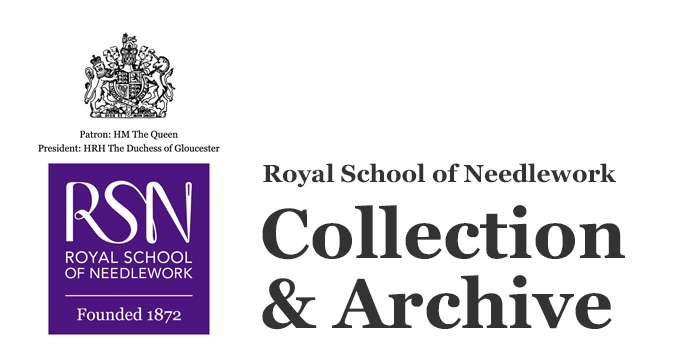Handkerchief
Object name
Date made
Early 20th century
Place made
Description
Early 20th-century monogrammed whitework handkerchief with Appenzell-style embroidery, likely stitched in Hong Kong.
Content description
This symmetrical and nearly perfectly square whitework handkerchief features Appenzell-style embroidery and was likely made in Hong Kong. The handkerchief involves fine bleached linen and white cotton threads. Padded and unpadded satin stitches, dot stitches, tapered trailing stitches, and stem stitches are used to create an intricate symmetrical floral and leaf pattern. In the centre is a wreath of small flowers and coils, leaving the centre of the handkerchief unembroidered. The wreath involves sections of single faggot stitches. The eight large flowers have large eyelet stitches with Ayrshire needlelace fillings and the smaller flowers have small eyelets at their centres. Various parts of the design are separated by lines of ladder stitches (pulled thread). The handkerchief has an intricate border covered in buttonhole edging stitches.
The slightly raised design on the handkerchief is made more distinct by the survival of graphite dust, creating what appears at first glance to be a grey outline around the design. Graphite dust was used to transfer the design to the cloth. In the unembellished centre of the handkerchief is a monogram 'BLF', suggesting the handkerchief's original owner had a first name beginning with a B, a middle name beginning with an F, and a surname beginning with an L.
This handkerchief closely resembles both the whitework embroidered handkerchiefs of Appenzell, Switzerland and Hong Kong, a special administrative region in China. Appenzell embroidery involves very fine whitework wrought in a variety of stitches, needlelace backgrounds, and floral motifs. Appenzell-style handkerchiefs were also made in places like Madeira, the Philippines, and Hong Kong. In 1924, the Swatow Lace Company was established in Hong Kong. This business produced huge numbers of Appenzell-style handkerchiefs. These handkerchiefs are oftentimes more elaborately decorated than their Swiss counterparts and sometimes involve imagery like cranes and Asian flowers. It is difficult to determine with certainty whether this handkerchief was produced in Switzerland or Hong Kong, but it was likely made in the latter.
The slightly raised design on the handkerchief is made more distinct by the survival of graphite dust, creating what appears at first glance to be a grey outline around the design. Graphite dust was used to transfer the design to the cloth. In the unembellished centre of the handkerchief is a monogram 'BLF', suggesting the handkerchief's original owner had a first name beginning with a B, a middle name beginning with an F, and a surname beginning with an L.
This handkerchief closely resembles both the whitework embroidered handkerchiefs of Appenzell, Switzerland and Hong Kong, a special administrative region in China. Appenzell embroidery involves very fine whitework wrought in a variety of stitches, needlelace backgrounds, and floral motifs. Appenzell-style handkerchiefs were also made in places like Madeira, the Philippines, and Hong Kong. In 1924, the Swatow Lace Company was established in Hong Kong. This business produced huge numbers of Appenzell-style handkerchiefs. These handkerchiefs are oftentimes more elaborately decorated than their Swiss counterparts and sometimes involve imagery like cranes and Asian flowers. It is difficult to determine with certainty whether this handkerchief was produced in Switzerland or Hong Kong, but it was likely made in the latter.
Dimensions
width: 29cm
height: 29.5cm
height: 29.5cm
Materials
Stitches
Satin stitch 
Stem stitch
Ladder stitch (pulled thread)
Single faggot stitch
Dot stitch
Small eyelet
Large eyelet
Padded satin stitch (laid work padding)
Tapered trailing
Buttonhole edging

Stem stitch

Ladder stitch (pulled thread)

Single faggot stitch

Dot stitch

Small eyelet

Large eyelet

Padded satin stitch (laid work padding)

Tapered trailing

Buttonhole edging

Techniques
Motifs
Catalogue number
COL.18
Other numbers
RSN 1136
© Royal School of Needlework
